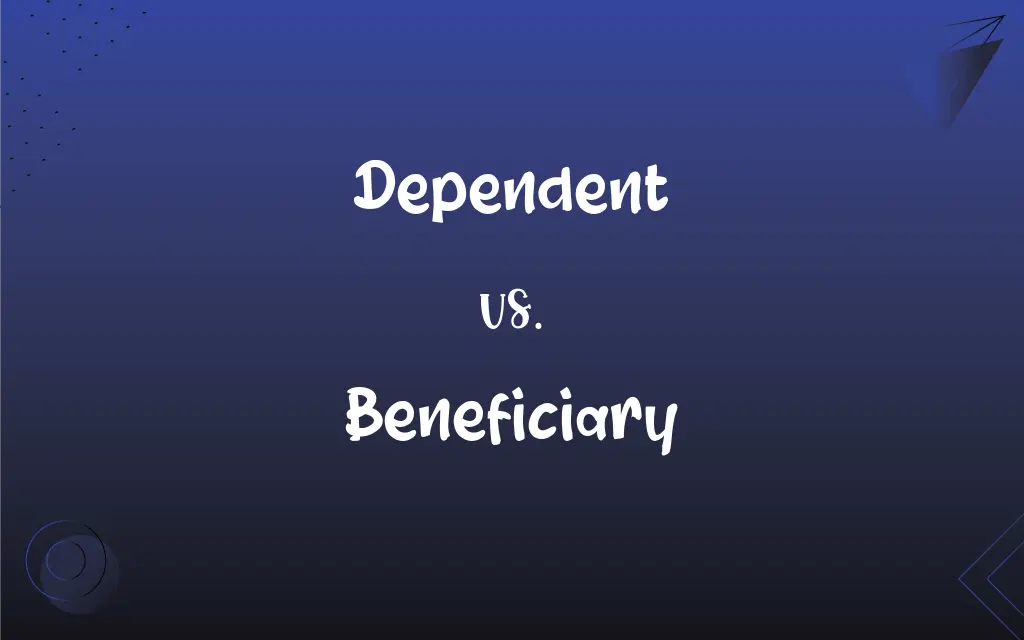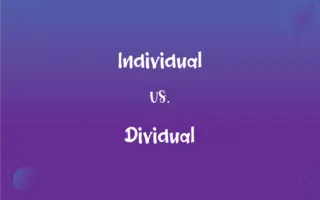Dependent vs. Beneficiary: What's the Difference?
Edited by Aimie Carlson || By Harlon Moss || Updated on November 30, 2023
A dependent is someone who relies on another, especially financially, while a beneficiary is someone who benefits from something, often a will or insurance policy.

Key Differences
A dependent typically refers to a person, often a child or spouse, who relies on another individual for financial support, whereas a beneficiary is an individual who receives benefits or advantages, especially from a will, trust, or insurance policy.
Dependents are often part of a family unit and their financial wellbeing is tied to the provider, while beneficiaries are designated to receive assets or benefits from legal instruments or contracts, irrespective of their financial dependency.
The role of a dependent is primarily based on the need for support, often due to age or inability to self-support, whereas a beneficiary's role is defined by legal entitlements to assets or funds as stipulated in a legal document.
Dependents often have a personal relationship with the provider, like a parent-child or spouse relationship, while beneficiaries may or may not have a personal relationship with the individual who has named them in a legal arrangement.
Tax implications often accompany the designation of dependents, potentially affecting the financial responsibilities of the supporter, while beneficiaries' tax implications are related to inheritance, estate, or gift taxes on received assets or funds.
ADVERTISEMENT
Comparison Chart
Definition
Someone reliant on another for financial support.
Someone entitled to receive benefits from a legal arrangement.
Relationship
Often family members like children or spouses.
Can be anyone named in a legal document.
Basis of Role
Based on need for support due to age or ability.
Based on legal entitlements in a will or policy.
Legal Documentation
Not typically involved in legal documentation.
Named in legal documents like wills, trusts, or insurance policies.
Tax Implications
Can affect the supporter's tax liabilities.
Implications related to inheritance or estate taxes.
ADVERTISEMENT
Dependent and Beneficiary Definitions
Dependent
Determined, influenced, or conditioned by something else.
The success of the project is dependent on timely funding.
Beneficiary
A person who derives advantage from something, especially a trust, will, or life insurance policy.
She was named the primary beneficiary of her uncle's will.
Dependent
A person who relies on another for emotional support.
After the divorce, she became his main emotional dependent.
Beneficiary
Someone who gains or benefits in some way from a situation.
Employees were the beneficiaries of the new tax reforms.
Dependent
A person requiring support from another, especially financially.
Her young daughter is listed as a dependent on her tax returns.
Beneficiary
One who benefits from the actions or decisions of another.
Local communities are the beneficiaries of the new health policy.
Dependent
Relying on someone else for aid or support.
As a student, he was still dependent on his parents.
Beneficiary
The recipient of funds, assets, or other benefits.
As a beneficiary of the scholarship, he could attend college.
Dependent
Unable to do without; reliant on something.
He became dependent on his medication during his illness.
Beneficiary
A person entitled to receive distributions from a trust or estate.
The children were listed as beneficiaries in the family trust.
Dependent
Determined, influenced, or controlled by something else.
Beneficiary
One that receives a benefit
I am the beneficiary of your generosity.
Dependent
(Grammar) Subordinate to another clause, phrase, or word.
Beneficiary
The recipient of funds, property, or other benefits, as from an insurance policy or trust.
FAQs
Do dependents always receive an inheritance?
Dependents do not automatically receive an inheritance unless named as beneficiaries.
Can a beneficiary be someone outside of the family?
Yes, beneficiaries can be any individual, organization, or entity named in a legal document.
Do dependents have legal rights to assets?
Dependents do not have inherent legal rights to assets unless specified as beneficiaries.
Can a beneficiary be changed?
Yes, the person who creates the legal document can usually change beneficiaries.
Is the role of a beneficiary limited to receiving money?
No, beneficiaries may receive various assets, including property, stocks, or other forms of wealth.
Are beneficiaries always individuals?
Beneficiaries can be individuals, groups, organizations, or even charities.
Can a dependent also be a beneficiary?
Yes, a dependent can also be named as a beneficiary in legal documents.
Is financial support the only type of support for a dependent?
While financial support is primary, dependents may also rely on emotional or physical support.
How are dependents identified for tax purposes?
Dependents are identified based on relationship, financial support, and residency criteria for tax purposes.
Can dependents be older than the provider?
Yes, dependents can be any age, including elderly parents.
Is the support for dependents always provided by parents?
No, support can come from any guardian or caregiver, not just parents.
How is a beneficiary designated in a will?
Beneficiaries are designated in a will by the will-maker, stating who receives specific assets or funds.
What types of assets can a beneficiary receive?
Beneficiaries can receive a variety of assets, including money, property, stocks, or personal items.
Do dependents have a say in financial decisions?
Dependents typically do not have a direct say in financial decisions unless they also hold a legal or decision-making role.
Can a dependent file taxes independently?
Dependents often do not file taxes independently, especially if they do not have significant income.
Can a minor be a beneficiary?
Yes, minors can be named beneficiaries, but legal guardians may manage the assets until they reach adulthood.
What happens if a beneficiary predeceases the benefactor?
If a beneficiary predeceases the benefactor, the inheritance may pass to alternate beneficiaries or revert to the estate.
Are spouses automatically dependents?
Spouses are often considered dependents if they rely financially on the other spouse.
Are there age restrictions for dependents?
While there are no strict age limits, tax definitions and support requirements may vary based on the dependent's age.
Can charitable organizations be beneficiaries?
Yes, charitable organizations can be named as beneficiaries in legal documents like wills or insurance policies.
About Author
Written by
Harlon MossHarlon is a seasoned quality moderator and accomplished content writer for Difference Wiki. An alumnus of the prestigious University of California, he earned his degree in Computer Science. Leveraging his academic background, Harlon brings a meticulous and informed perspective to his work, ensuring content accuracy and excellence.
Edited by
Aimie CarlsonAimie Carlson, holding a master's degree in English literature, is a fervent English language enthusiast. She lends her writing talents to Difference Wiki, a prominent website that specializes in comparisons, offering readers insightful analyses that both captivate and inform.































































